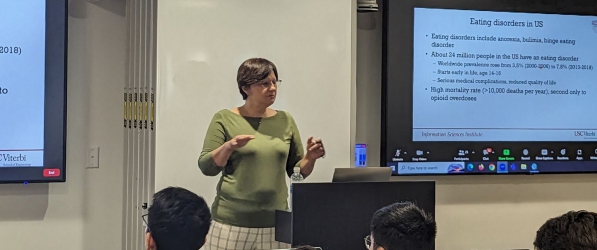Speaking to a standing-room-only crowd, Professor Kristina Lerman, Principal Scientist, University of Southern California Information Sciences Institute, spoke about the profound impacts of social media on mental health. Public health data in the U.S. indicates a significant rise in depression, anxiety, and self-harm among young individuals, with a particular emphasis on the alarming increase among girls. This development coincides with the rise in screen time and a decline in face-to-face social interactions among youth.
Professor Lerman acknowledged that these developments coincide with decreases in mental health stigma; however, data around symptoms (such as emergency room visits) speaks to an objective decline in youth mental health. She identified three major mechanisms driving this trend. First, the lack of safety on these platforms fosters toxicity and cyberbullying. Second, negative social comparison thrives in an environment where youth are exposed to idealized and curated profiles, further exacerbated by algorithms. Lastly, social dynamics within these platforms create echo chambers and foster radicalization.
Professor Lerman highlighted the rise in eating disorders linked to social media: over an 18-year period, the global percentage of individuals suffering from disordered eating increased from 3.5% to 7.8%. Social media sites often direct users searching from health and dieting information towards harmful content linked to disordered eating; the platforms also foster communities around these behaviors, with some individuals positioning themselves as "coaches." These online communities mirror patterns identified in online radicalization, providing users with narratives, a network, and a sense of significance.
Professor Lerman acknowledged that solutions to these harms are difficult, but likely require policy action. Heightened legal protections for minors and rigorous enforcement of these safeguards, including age requirements to create a social media account, show utility. Additionally, early education on safe online behavior is crucial. The data also suggests that online interactions become more negative as individuals move further away from their actual social circles, suggesting value in designs that limit online engagement to individuals with whom one has real connections.
This event was co-sponsored by Pitt Cyber and Department of Informatics and Networked Systems (DINS)

